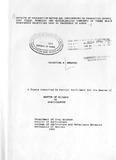| dc.description.abstract | Two experiments were carried out between August 1990 and May 1991 at the Field Station, University of Nairobi, Kabete Campus, to study the effects of propagation methods and deflowering on vegetative growth,leaf yield and some quality aspects of black nightshade (Solarium spp) . In the first experiment, the three selections of the vegetable were studied and the plants were either deflowered or not. These formed six treatments which were set in a randomised complete block design. In the second experiment, two methods of propagation (seed and vegetative) were studied and the plants were either deflowered or not. These together with the three selections of the vegetable formed twelve treatments set in a split-plot design.
Vegetative growth was assessed by measuring the plant height and spread and counting the number of branches per plant while fresh and dry weights of the edible portions in Kg/ha were used to asses the yield. Leaves were analysed for total phenolics and glycoalkaloid contents.
Seed propagation led to taller plants with a wider spread, more number of branches and a higher leaf yield than vegetative propagation. Solanum pseudoniarum non-serrated type showed a more vigorous growth and higher leaf yield than the other two selections. Deflowering resulted in shorter and less spreading
plants, which however, had more branches and a higher leaf yield.
Vegetative propagation significantly decreased the phenolic contents during the early stages of growth and increased the glycoalkaloid contents of the leaves. Deflowering was found to decrease the accumulation of phenolic compounds but had no significant effect on the total glyloalkaloid content of the 1 eaves.
Propagating S. pseudoniqrum non-serrated type vegetatively gave taller plants with significantly fewer branches and lower leaf yields than seed propagated plants. The same applied to vegetatively propagated S. nigrum plants which however, had higher leaf yields than the two types of S. pseudoniqrum. Vegetative propagation of S. pseudoniqrum serrated type significantly reduced the plants height and branching and hence the leaf yields.
Propagating the black nightshade through seed therefore leads to a more vigorous vegetative growth and hence higher leaf yield. | en_US |

